- Home
- Kendare Blake
Five Dark Fates Page 2
Five Dark Fates Read online
Page 2
“I thought it might be welcome,” he says softly.
“It is,” Katharine says. “But I have had enough of sitting in that room. Perhaps in the drawing room or the solarium.” She trails off and puts her hand to her eyes.
“Perhaps right here on the floor. It is still your home if you wish it. A tea party on the carpet.”
“Just like we never used to have,” Katharine says. But she smiles at him, and they step aside as a maid enters Pietyr’s room. “Where are the healers?”
“They have clustered in the library,” Edmund replies. “And are demanding lunch.”
“I suppose that they will need to eat.” Katharine and the butler fall in step beside each other down the hall. “Poor Edmund. I have turned your household upside down.”
“Nonsense, my queen. It is good to have heartbeats in Greavesdrake again. Even the heartbeats of new staff and strangers. Since Natalia was killed, it has not felt like a great house so much as a shrine.”
How right he is. As they ascend the stairs, the sounds of people in its farthest corners, the bustle and occasional laughter of servants, make Greavesdrake feel alive again. Still draughty and dark, of course. But alive and no longer haunted.
It will feel haunted forever if Pietyr dies upstairs.
In the main floor dining room, they find Genevieve, reading a book over a half-eaten bowl of soup.
“How is he?” she asks, and sets the book down.
“Unchanged.” Katharine sits across from her as Edmund readies the tea.
“Unchanged,” Genevieve repeats, and sighs.
Katharine watches her carefully. Katharine was the one who “found” Pietyr, unconscious and covered in blood, just as she was with Nicolas the night her poisoned body killed him. Two lovers, one dead and the other unable to wake. Though Katharine was careful to dispose of all evidence of the low magic, Genevieve must still have her suspicions.
“He will wake,” Genevieve says, and tries to bolster Katharine with a smile. “He is too meddlesome not to.”
Katharine nods. She is about to bite into one of Edmund’s excellent crumbly shortbreads when they hear the front door open and the servants speaking in raised voices. Soon enough, a breathless messenger arrives in the doorway.
“Well?”
“She’s at the Volroy,” the messenger declares, her eyes wide.
“Who?” Genevieve asks. “Were we expecting someone?”
Katharine stares at the girl. She knows, by the way the messenger avoids speaking the name and the fearful wonder in her eyes, that she means Mirabella. Her powerful sister has come. The strongest of the triplets. The strongest queen in generations has come at her request.
Katharine’s legs twitch beneath the table. She is so eager to meet Mirabella, to look her in the eye under an offering of peace. But she is careful to control her reaction.
“Who?” Genevieve asks again, losing her patience.
The messenger opens her mouth but says nothing, trying to decide how to phrase it without breaking decorum. “The queen’s sister,” she says finally.
“Mirabella,” Katharine supplies, and Genevieve gasps.
“She—? She would come here?”
“She was invited.”
“By who?”
“By Luca,” Katharine says. “And I suppose, by me. Where is she now?” she asks the girl.
“Waiting for you at the Volroy. The guards are holding her in the throne room.”
“Has anyone seen her? Spoken to her? Anyone from my Black Council?”
“No, my queen.”
Katharine rises. “Then ride quickly back there ahead of me and make sure that no one does. No one is to see my sister before I do. Not Antonin or Bree Westwood. Not even High Priestess Luca. Is that understood?”
“Yes, my queen.”
“Good. Hurry. Take a fresh horse.”
Katharine and Genevieve share a carriage to the Volroy. Genevieve’s jaw has not unclenched since receiving the news, and she holds her arms crossed tightly over her chest.
“I am to be your eyes and ears. How? When you tell me nothing!”
“Luca and I told no one of this,” says Katharine. “Honestly, Genevieve, I did not think she would come.” She turns back toward the receding bulk of Greavesdrake and to the window of her old bedroom, wishing that the curtains would move and reveal Pietyr standing there. He would love to be at the Volroy for this meeting. And she does not know how she will fare without him.
“Why is she here?” Genevieve asks. “What good can she do?”
“She is another queen. She can help me win the war,” replies Katharine. “If I can trust her.”
“Neither of you are queens,” Genevieve says, her voice thick with disgust. “If you were, there would only be one of you left.”
THE VOLROY
“We have received word that the queen is on her way.”
“Thank you,” Mirabella says. They have put her in the throne room to await Katharine. The guard nods and leaves, closing the heavy doors. No doubt they are stationed three deep on the other side, afraid Mirabella will blast the door open with a gust of wind and set fire to the entire castle.
She snorts softly. She could, she supposes, be free of the Volroy within minutes if she chose. Her gift, now that she has returned to the island, has come back even stronger and quicker than it was when she left. Though she still may not be able to blast through the door. To do that she might need a different kind of gift. A gift like Jules has.
She unfastens her cloak and drapes it across a chair before the long, dark table beside the throne—the table where the Black Council must sit on days when the queen gives audience. She runs her fingers along the back of the chair. Who does it belong to? Bree? Or perhaps Luca? Probably not. This seat, directly to the right of the throne, is probably reserved for one of the Arrons. The eldest woman. Or that pale-haired boy of Katharine’s, Pietyr Renard.
Mirabella’s eyes roam over the room. The walkways of the stone and wood floor have been overlaid with carpets woven in designs of black and gold. The hammer-beam ceiling shows intricate carvings representing the gifts and many of the great queens, the wood itself very dark and the ceiling painted in stunning black and silver. Luca used to tell her about it all when she was a girl. She sat by Luca’s knee and daydreamed of the time when she would rule in the castle beneath all that history. She looks up and tries to spot the carving of lightning and thunderclouds for her favorite, Queen Shannon. And of course it does not take long to find the plaster and wood plaque crafted for Queen Illiann, as it is the only part of the ceiling painted blue.
Mirabella wanders to the throne and steps up beside it, her fingertips just grazing the gilded arm. Even now, it feels like it is hers, this thing she has been directed to, pointed at, since the day she was born. But it is not her portrait that hangs behind it. No portrait of fire and fierce storms, no elemental queen with her gown billowing behind her. Instead, the portrait that hangs there is Katharine’s, dark and still, and full of bloody bones.
“Do you want to sit in it?”
Despite herself, Mirabella jumps. And when she turns, there she is: wicked, deadly little Katharine, who slipped inside silently, without so much as the creak of a door or the rustle of a skirt.
“To pretend for a while that you won?”
“No,” Mirabella says. “Of course not.”
“Then get away from my seat,” says Katharine, and smiles. “Come and greet me properly.”
Properly, Mirabella thinks. Is she expected to kneel and kiss her ring? She could not bring herself to do it. She does not know if she can even steel her spine enough to touch Katharine at all, for fear of a poisoned blade quickly buried in her neck.
Katharine walks slowly forward. Her black eyes glitter. Unlike her guards, she seems not the least bit afraid.
Mirabella steps down and away from the throne, forcing her legs to move across the carpet. The sisters stop in the center of the room, no more than an arm’s len
gth away from each other.
“Do not ask me to bow,” Mirabella says. “I am here as an ally, not a subject.”
“I will not ask you to bow any more than I will ask you for embraces.” Katharine’s mouth crooks. “Not yet.”
Mirabella relaxes slightly. They have not been this close since the banquet before the Queens’ Duel, when Katharine dragged her around the dance floor like a marionette shortly before Mirabella was poisoned by Billy’s father. But she remembers well the coldness of Katharine’s grip and the strength in her fingers.
“I am surprised that you came,” Katharine says, and crosses her arms. “You could not have been pleased that I cut that naturalist’s throat.”
“It was supposed to be a trade. The Legion Queen for her mother. No one was supposed to die.”
“And no one would have, if not for the mist. And if she had not tried to run.”
Mirabella swallows. Her mouth has gone completely dry.
“I did not turn to your side,” she says. “And I did not turn against Arsinoe. I turned against Jules Milone when I saw what the curse had done to her.” She narrows her eyes. “Or, I suppose, what you turned her into when you cut the blood-binding loose from her mother’s neck.”
Katharine cocks her head, indifferent. “All that did was reveal the monster she always was underneath. And what a monster she was. She will be a handful, even for you.”
She will be more than that, Mirabella thinks. The war gift that Jules hurled at her in the valley knocked her clean off her feet. And Jules had not even truly been aiming.
Katharine walks around Mirabella in a slow circle, and Mirabella straightens as she is appraised. The queen looks over the stains in the blue fabric of her dress, the torn and dirty lace. It is a rather poor fit as well—too tight in the bodice and bosom, cut for the thin, wiry figure of Billy’s sister, Jane. Mrs. Chatworth had brought in a tailor to make alterations, but the fabric had its limits.
As Katharine walks behind her, Mirabella is careful to keep her in her sights.
“Is that all?” Katharine asks. “All it took to make you desert the rebellion?”
“It was not all.” Mirabella looks down. “I am a queen. A true queen, in the blood. And the line of queens should not be set aside so lightly. Not even if the future of it resides in someone as terrible as you.”
Katharine whirls. She holds her hands together so tightly that they shake.
“An interesting choice coming to the Volroy dressed as a pauper,” she says finally, her voice light. “Was it intentionally symbolic, or could you just not manage anything else?”
“On the mainland, this dress was one of the finest in the city.”
Katharine raises her brows. “No matter. We will have you dressed in proper blacks and looking yourself again soon enough.”
“Would you want that? Should I not be dressed in a penitent cloak of gray? To show my shame and my deference to the crown?”
“The people do not need to be reminded of who wears the crown,” Katharine says. “And if you are here, I would have them see you. You, the great elemental queen, come to fight by my side. If you are here, you will be of use. But only when I choose. Guards!” The door to the throne room opens, and in moments, Mirabella finds herself surrounded again by the points of spears.
“Take my sister to the king-consort’s apartment.” She turns to Mirabella. “My sweet Nicolas did not have the chance to enjoy it before he was killed in the fall from his horse, and I will not have such fine furnishings go to waste. And of course, there are no chambers designated to hold a Queen Crowned’s sister.” Katharine pivots on her heel, and shining black curls bounce over her shoulder. “I will send Bree Westwood and the priestess Elizabeth to see you. I am sure you would be comforted by their presence. And then I will have a small meal sent up. But do not eat too much. Tonight you will dine with me.” She stops at the door and smiles at Mirabella broadly.
“We have much work to do.”
Katharine goes from the throne room to the Black Council chamber and shuts herself inside. The moment she is hidden from view, she begins to tremble as she hugs herself and paces.
She had been face-to-face with Mirabella again, and she had done well. The black crown emblazoned across Katharine’s forehead had acted like a shield, giving her courage and lending righteousness to her words. It had been hard not to shout. Not to strike out preemptively. Everything about Mirabella put her on the defensive: the way she stood in the throne room, beautiful and regal, even in that hideous wreck of a dress; the lingering bonds of affection she still holds with many members of Katharine’s Black Council.
Perhaps it was a mistake to bring her here. Perhaps she is falling right into Luca’s trap.
Even the dead queens, as they hissed and sniffed around her, also tugged against Katharine’s edges, drawn to the strength of the elemental gift that flowed off Mirabella in waves.
“You would leave me for her.”
Never, they whisper. You are ours. We are you.
But Katharine feels them pull against her skin. She feels them rise up and nearly slip out of her mouth. The dead queens had a taste of being outside her, of moving through another person when they left her to rush into Pietyr. And they liked it.
We are with you, always.
“Always,” says Katharine as a plan begins to form in her mind. She could be free of them, and free of them for good, if she is careful, and if she is more clever than they are.
SUNPOOL
Wolf Spring arrived in time for Madrigal’s burning. Cait and Ellis Milone, their backs straight and rigid as knives. Luke, cheeks wet, in a deep crimson vest and coat he was sure to have sewn himself. And much of the city came with them. Madrigal burned, in the salt spray and wind, atop the chest-high pyre of wood that the workers of the rebellion had built. The priestesses of Sunpool had wrapped her in crimson cloth and covered her in crimson petals. The rebels left offerings of wreaths and colored shells. Birds’ eggs to crack and sizzle in the heat.
Together Wolf Spring and the rebellion watched as the pyre blazed, turning to ash the body that was not really Madrigal Milone any longer but merely the very pretty shell that could barely contain her.
Madrigal, Arsinoe thinks now, in the echoing whispers of Sunpool’s great hall. Madrigal was the sum of her actions. She was a laugh in a quiet room. In life, she had never liked for anything to be easy, and in death she was the same.
“I thought you were dead, too.”
At his voice in her ear, Arsinoe turns and grasps Luke around the waist. “I’m so sorry,” she says, over and over, and only lets him go when his black-and-green rooster, Hank, begins to flap and spur holes into her only good pair of trousers. They sit down together at the nearest open place.
“Where’s your boy?” he asks.
Arsinoe gestures to Billy in the crowd, where he spoons meat and gravy onto plates. All through the burning he let her lean on him without being seen to be leaning. When the flames touched the crimson cloth, he held her close.
“Getting you food, eh?” says Luke. “He knows you well.” Then he lowers his eyes. “The funeral was well attended.”
Arsinoe nods. “You would think she was someone important.” Luke clears his throat, and she knows that Cait and Ellis are there.
“We wanted to wait,” she says to Cait. “But we didn’t know if you would be able to come.”
“Your letter reached us,” Cait says. “That is what matters. What of her sister? Has no one told Caragh?”
“I sent a letter to the Black Cottage, but—” Arsinoe shakes her head. “Maybe travel is slower . . . with the baby. . . .” She closes her mouth and looks to Ellis. Cait will be all right. She was made to bear. But Ellis—gentle, scholarly Ellis—he has doted on Madrigal since the day she was born.
In the crowd, Arsinoe spots a slew of familiar faces. A few of the Paces, and the Nicholses. Shad Millner and his seagull. Even Madge, who sold the best stuffed fried oysters in the Wolf Spring mark
et. And Matthew. Of course Matthew.
“Matthew,” she says when he sees her, and he walks forward and scoops her up, almost like he did when she was a child.
“Hello, kid,” he says, and sets her back down on her feet. He wipes a tear from her cheek with his thumb and adjusts the knot of her crimson scarf.
Billy returns to the table with food and greets them all, especially Matthew, who he views as extended family through his connection to Joseph. His eye lingers on the crow on Cait’s shoulder. “Is that Aria?” he asks, speaking of Madrigal’s familiar.
“No,” Cait replies. “This is Eva. Aria flew away from the smoke. Where is Jules? In your letter you said she was unhurt but still unwell. What did you mean?”
Arsinoe rises. “I’ll take you to see her. But only you two,” she adds when Luke and Matthew move to join them. It would be too difficult for Luke to see her in that state, and Matthew—Matthew looks too much like Joseph. She does not want to think about how Jules would react if she opened her eyes and saw Joseph’s face. As Arsinoe and Billy escort Cait and Ellis from the hall, she stiffens with sudden realization.
“He doesn’t know.” She grasps Billy’s arm. “Matthew and the Sandrins, they don’t know about Joseph. They don’t know that he’s dead!”
“Dead?” Ellis exclaims as Billy shushes them both.
“I’ll tell them,” he says. “He was my brother, too, in a way. And I can describe what happened as well as you can.”
“Tell them where he’s buried,” Arsinoe says hurriedly. “Tell them about the headstone, the inscription—”
“I’ll tell them everything. Go. Take them to see Jules.”
Arsinoe nods and leads them on, almost in a daze. As they make their way up the stairs to the tower, she tries to prepare them for what they will find, telling them as gently as she can what happened: how the legion curse was cut free when Madrigal died and what a violent reaction it sparked in Jules.
“She might not even be awake,” she warns. “The tonics I craft to keep her calm sometimes make her sleep during the day.”

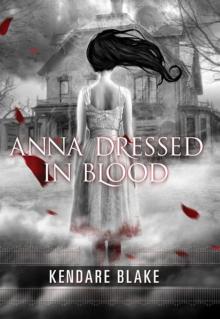 Anna Dressed in Blood
Anna Dressed in Blood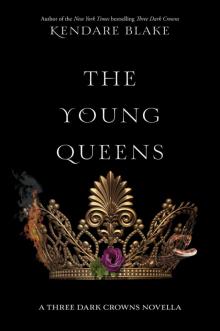 The Young Queens
The Young Queens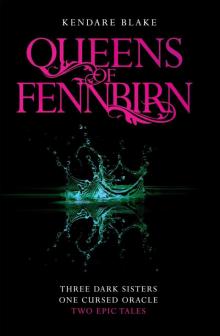 Queens of Fennbirn
Queens of Fennbirn Antigoddess
Antigoddess The Dogs of Athens
The Dogs of Athens Ungodly
Ungodly Mortal Gods
Mortal Gods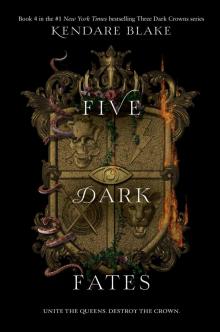 Five Dark Fates
Five Dark Fates Girl of Nightmares
Girl of Nightmares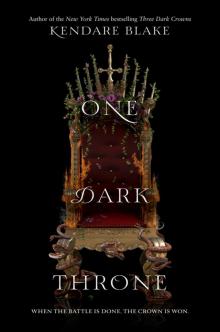 One Dark Throne
One Dark Throne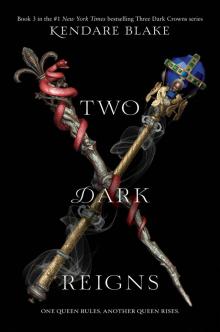 Two Dark Reigns
Two Dark Reigns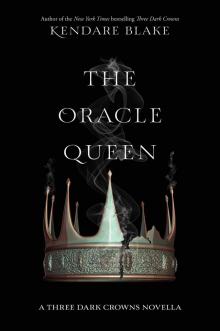 The Oracle Queen
The Oracle Queen Antigoddess gw-1
Antigoddess gw-1